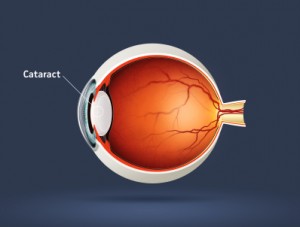Cataract surgery is a common procedure that many people undergo to improve their vision. If you are considering cataract surgery, it is important to understand what the surgery entails and what to consider when deciding whether it is the right option for you.
What Are Cataracts?
A cataract is an eye condition in which a clouding of the eye’s natural lens prevents light from passing through the eye correctly, resulting in vision problems.
There are many reasons why people develop this condition, including age, eye injuries, certain medications, hereditary conditions, prolonged exposure to UV light, smoking, diabetes, and glaucoma.
Those who develop cataracts may notice the following symptoms:
- Blurry vision
- Double vision
- Halos around lights
- Increasing difficulty distinguishing colors
- Difficulty reading
- Declining night vision
Patients often describe their vision as like looking through wax paper.
Cataract Treatment Options
There is currently no way to reverse cataracts through medications or eye drops, but there are ways to treat the condition.
For patients whose cataracts have not yet noticeably affected their vision, prescription eyeglasses and contact lenses can help correct vision issues. When these options no longer help you achieve clear enough vision, it may be time to consider cataract surgery.
In the past, cataract surgery was a risky procedure that involved a hospital stay, but today it is performed in an outpatient surgery setting and is one of the most common, safest, and most successful procedures performed.
How Is Cataract Surgery Performed?
Cataract surgery works by replacing your clouded lens with a clear, artificial lens (called an intraocular lens).
Here is what you can expect from the procedure:
- Before the procedure, a thorough and careful assessment will be performed on your eyes.
- Beginning three days before the procedure, you will begin using eye drops to prepare your eyes for cataract surgery.
- On the day of the surgery, eye drops will be used to dilate the pupils, and a local anesthetic given.
- A micro-incision is made in the cornea (the clear layer at the front of your eye), and a probe that emits ultrasound waves is inserted.
- The ultrasound waves emitted by the instrument work to break the affected lens up into microscopic pieces. Those pieces are then suctioned out.
- The cataract surgeon then inserts the clear, intraocular lens.
The advances in technology today allow cataract surgery patients the option of reducing their need for glasses simultaneously with their cataract procedure. Your surgeon will discuss with you your lifestyle, activities and the type of vision you desire after surgery in order to determine the best lens implant for your particular needs.
After surgery, you’ll typically spend an hour or less in recovery before you are released to go home, though you will need someone to drive you.
Is Cataract Surgery Affordable?
Having surgery to remedy cataracts is an important part of maintaining your eye health, and Berkeley Eye Center helps to make it affordable for all of their patients. If you have health insurance, it will most likely cover the following in a traditional cataract surgery, less deductibles and copayments:
- Post-operational monofocal lens
- Outpatient surgery fee
- Cost of anesthesia
- Surgeon’s fee
Even if you do not have insurance, or are having an astigmatic evaluation and a premium lens cataract surgery, Berkeley Eye Center makes your procedure affordable by offering cataract surgery financing and low monthly payments, even on annual insurance deductibles.
Deciding When To Have Cataract Surgery
Just because you have a cataract does not necessarily mean you need surgery. In many cases, patients live for months or even years without serious vision problems related to their condition. However, when it starts interfering with your daily activities, it might be time to consider surgery as an option.
The decision to have cataract surgery should be made between you and your doctor. Your Houston cataract surgeon will ask you to consider certain questions before you choose to have the procedure:
- Are your vision problems preventing you from safely performing your job and driving?
- Is reading or watching TV becoming an impossible task?
- Are you unable to go shopping, cook, do yard work or other daily tasks without difficulty?
- Are you unable to see faces clearly?
- Is the glare from headlights making it hard for you to drive at night?
- Is your vision making it difficult for you to maintain an independent lifestyle?
If the answer to these questions is yes, it might be the right time to consider cataract surgery.
Frequently Asked Questions About Cataract Surgery
How long does it take to recover from cataract surgery?
Recovery times vary from person to person but are typically short. In most cases, patients return to normal daily activities the next day.
Is cataract surgery painful?
No. You will receive numbing eyedrops before the procedure, so you will not feel any pain during the procedure.
Can I get cataracts again after having surgery?
No, you cannot get cataracts again. Cataracts grow on the eye’s natural lens, which is removed during the surgery.
Schedule a Cataract Surgery Consultation Today
To learn more about the cataract surgery procedure and find out if it’s right for you, contact the Houston cataract surgeons at Berkeley Eye Center today to schedule an appointment.
